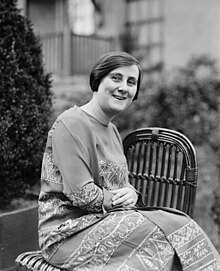Bertha Lutz
| Bertha Maria Júlia Lutz | |
|---|---|

Bertha Lutz in 1925
|
|
| Born |
August 2, 1894 São Paulo, SP, Brazil |
| Died |
September 16, 1976 (aged 82) Rio de Janeiro, RJ, Brazil |
| Nationality |
|
| Other names | Lutz Berta |
| Occupation | Brazilian scientist |
Bertha Maria Júlia Lutz (August 2, 1894 in São Paulo – September 16, 1976 in Rio de Janeiro) was a Brazilian zoologist, politician, and diplomat. Lutz became a leading figure in both the Pan American feminist movement and human rights movement.
Bertha Lutz was born in São Paulo. Her father, Adolfo Lutz (1855–1940), was a pioneering physician and epidemiologist of Swiss origin, and her mother, Amy Fowler, was a British nurse. Bertha Lutz studied natural sciences, biology and zoology at the University of Paris - Sorbonne, graduating in 1918. Soon after obtaining her degree, she returned to Brazil.
In 1919, one year after returning to Brazil, Lutz founded the League for Intellectual Emancipation of Women and was appointed to represent the Brazilian government in the Female International Council of the International Labor Organization (ILO). Lutz later created the Brazilian Federation for Women’s Progress in 1922, a political group which advocated for Brazilian women’s rights, most importantly their right to vote, around the world. Lutz served as a delegate to the Pan-American Conference of Women in Baltimore, Maryland, US that same year, and would continue to attend women’s rights conferences in the years to come. In 1925, she was elected president of the Inter-American Union of Women. Lutz’s involvement in the fight for women’s suffrage made her the leading figurehead of women’s rights until the end of 1931, when Brazilian women finally gained the right to vote.
Lutz’s advocacy for the rights of women did not end with the right to vote, and she continued to play a prominent role in the feminist campaign. In 1933, after obtaining her law degree from Rio de Janeiro Law School, Lutz participated and introduced several proposals for gender equity in the [Inter-American Conference] of Montevideo, Uruguay. Most notable of these proposals was her call for the refocusing of the Inter-American Commission of Women on the issue of gender equality in the workplace. In 1935, Lutz decided to run for Congress and came in second behind Cándido Pessoa, and replaced him when he died a year later, making Lutz one of the few Brazilian Congresswomen of the time. The first initiative that Lutz presented while in Congress was the creation of the “Statue of women”, a committee with the intended purpose of analyzing every Brazilian law and statute to ensure none violated the rights of women.
...
Wikipedia
